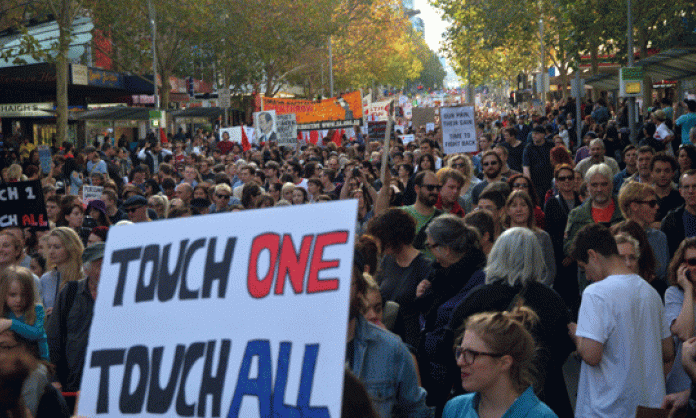The impressive turnout at emergency protests across the country today shows it is possible to stop the Liberals’ class war budget in its tracks.
Up to 20,000 took to the streets in Melbourne and Sydney. Five thousand protested in Adelaide and 1,000 in Perth and Brisbane.
These are impressive numbers given the context. In Melbourne, the protest was only called on Wednesday night and was built almost entirely on social media. There was little institutional backing other than from the Greens.
In other states, pre-planned “March in May” events, which had looked like being fairly lacklustre, were transformed into angry anti-budget protests.
Impressive as these protests were, they drew only a fraction of the people who can potentially be mobilised against this all-out attack on workers, pensioners, young people, the poor, people with disabilities, Indigenous people, students, and many more.
For this budget to be beaten, a much wider social mobilisation is necessary. Most importantly, the union movement has to put itself at the front of this fight. Today’s turnout is a challenge to the unions. Are they prepared to go all out to fight this savage ruling class assault, or will they persist with the decades-old strategy of “boxing clever”, “keeping our powder dry” and waiting for the next election?
If Abbott gets this budget through, especially if he does so without a monumental campaign to stop him, we will be well along the path to the destruction of the conditions and rights that workers spent decades fighting to establish.
The unions have the power to bring out the hundreds of thousands of workers who are seething with anger at this budget, but who are not going to be mobilised simply by Facebook and community campaigns driven by the left. The core battalions of the labour movement in construction, manufacturing, transport, the mines and on the wharves, in alliance with workers in health, the public service and in the education sector who are in the firing line of this budget, have the power to tear down this government. But to do so will require a commitment to mobilise on a scale and with a determination that has not been seen for many years.
There is no point in ignoring the difficulties on our side. The union movement is still a mighty power, but its machinery has rusted from lack of use. But if there was ever a chance to reverse the long decline of union power, it is now.
This budget is hated with venom not seen in Australia for years. The fact that a few lefties can get such numbers on the streets at a few days notice is evidence that people are prepared to mobilise. And we also have the unusual situation of an opposition leader, Bill Shorten, who is for now actually acting like he thinks that Labor should take on the Liberals.
In a situation where even Shorten can recognise this budget as an opportunity to turn around Labor’s fortunes and reconnect with its alienated base, it will be an utter indictment of the union leaders if they do not take this outpouring of anger and organise it into a serious fightback.
So far it is only the Victorian union movement that has indicated it plans to mobilise workers on the streets. Victorian Trades Hall has called an all members union meeting for this Tuesday evening, 20 May, at Trades Hall.
Trades Hall has announced plans for a stopwork on 12 June and a mass community rally on 21 June. All the resources of the union movement need to be poured in to making these genuinely mass actions that galvanise the workers’ movement into a fighting force.
An all-unions delegates’ meeting urgently needs to be organised – along the lines of the thousands strong meetings, organised by Victorian Trades Hall, that kick started the national anti-WorkChoices campaign. Every union delegate in every workplace needs to view building a fightback as the key task of union activism over the coming months.
The unions, particularly the health unions, also need to mobilise seriously to get thousands out on the streets in Melbourne for the Save Medicare rally on 30 May.
Outside of Victoria, all possible pressure needs to be brought to bear on the union leaders to follow the Victorian example and take action.
The other crucial element of this campaign is the students. It is hoped that thousands will join protests on 21 May against the staggering attacks on higher education contained in this budget. Already, student activists have dogged Liberal politicians whenever they have come onto university campuses. This has had an impact on the national debate, sending a signal that some people are willing to take the fight to the government.
A serious campaign of street protests and strikes could transform passive hostility to this government in to a tide of revolt. Even before the budget Abbott was hated. Now many who voted for him can see that all the bluster about “stopping the boats” was simply a cover for a party determined to launch full scale war on workers, students and the poor.
Alongside an industrial and street protest campaign, the left needs to be fighting to commit Labor, the Greens and Clive Palmer to block this budget.
While we have heard some fighting words against Abbott in recent days, students and workers can’t rely on politicians to stand on principle. We need to make it apparent that any party that does a grubby deal to let these attacks through will face our wrath.
Any party or politician tempted to negotiate some shabby compromise must be told in no uncertain terms that to do so will condemn them to the fate of Meg Lees and the Democrats when they passed John Howard’s GST.
It is in the clear interests of the entire labour movement, as well as the ALP and the Greens, to fight this budget. But we know from bitter experience over the last 20 years that, even when a fight is started by Labor politicians and union leaders, the temptation to pull back – to compromise, to capitulate to scaremongering from the media and pressure from big business – leads time and again to disaster.
For that reason, we can’t just hope that they will do the right thing this time around. Out of this struggle, it is imperative that we start to rebuild, on the left and in the workers’ movement, a current committed to class struggle politics, committed to taking the fight to government and the bosses, committed to relying on the power of workers and students on the streets and in workplaces and campuses, rather than hoping that the politicians will vote the right way.
In 1996, at a huge protest in Canberra on the eve of John Howard’s savage first budget, ACTU leader Jennie George stood in front of tens of thousands of workers. But instead of telling them that they had the power to stop Howard, she addressed the parliamentarians from Labor, the Greens and the Democrats who were also present, and told them “our fate is in your hands”.
This moment symbolised the crucial mistake that was to dog the labour movement through the whole Howard era – hoping for the best from politicians rather than mobilising workers and students on the streets to fight for their own interests. It is a mistake we can’t let happen again.









